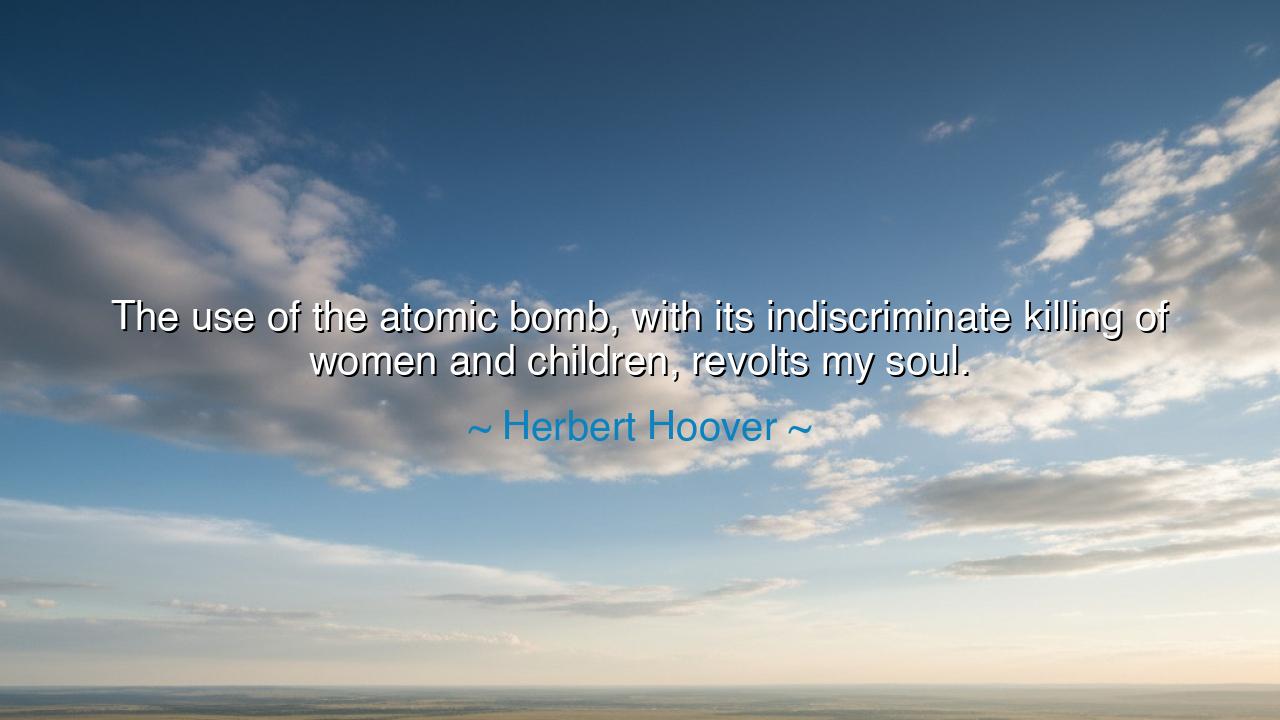
The use of the atomic bomb, with its indiscriminate killing of
The use of the atomic bomb, with its indiscriminate killing of women and children, revolts my soul.






Herbert Hoover, once president of the United States and a man who had witnessed the horrors of war and famine, uttered these words with anguish: “The use of the atomic bomb, with its indiscriminate killing of women and children, revolts my soul.” In this cry we hear not the calculation of a statesman but the lament of a human being confronted with the abyss of destruction. For the atomic bomb was no ordinary weapon—it was the breaking open of nature’s deepest fire, unleashed not upon soldiers alone, but upon the innocent, the defenseless, the unseen multitudes who carried no sword.
The origin of this declaration lies in the aftermath of Hiroshima and Nagasaki in 1945. Hoover, though no longer in office, observed the devastation with horror. To him, the victory gained through such means was poisoned by its cost. The indiscriminate killing of civilians was not the triumph of civilization, but its undoing. His soul, trained to the disciplines of engineering and administration, revolted against the cold logic that justified mass death as necessity.
History bears witness to the truth of his anguish. In Hiroshima, tens of thousands perished in an instant; shadows burned into walls, mothers clutching children turned to ash. Nagasaki soon followed, repeating the unspeakable. Those who survived carried wounds in body and spirit, reminders that the new age of war would forever place the innocent in its crosshairs. Hoover’s words are the echo of conscience, the protest against a weapon that dissolved the ancient boundary between warrior and civilian.
So too have others, across time, recoiled at the slaughter of innocents. When Carthage was burned by Rome, when entire cities were leveled in the firestorms of World War II, the question has always returned: can a civilization call itself great when it destroys without distinction? Hoover’s cry joins this ancient chorus, proclaiming that to preserve humanity, one must resist the temptation to wield absolute power without restraint.
Therefore, O children of tomorrow, let Hoover’s lament be your warning. Technology gives man the power of gods, but without conscience, that power becomes damnation. The atomic bomb was not merely a weapon; it was a mirror, showing humanity its own capacity for annihilation. To recoil in the soul, as Hoover did, is not weakness but wisdom. For the measure of true power is not in what man can destroy, but in what he dares to spare.






MTBui Minh Tan
The moral outrage expressed by Hoover is something that resonates deeply. The atomic bomb, with its capacity for indiscriminate destruction, seems to strip away any semblance of humanity in warfare. Shouldn’t the suffering of civilians be a major consideration when making decisions about military strategy? How do we reconcile the need for military victories with the ethical responsibility we have to protect innocent lives? Can we ever truly reconcile such destruction?
PNPhuc Nguyen
Herbert Hoover’s quote makes me think about the long-term psychological and societal effects of using atomic bombs. The destruction of entire cities and the irreversible damage caused to civilians—especially women and children—feels beyond comprehension. What does this say about the value we place on human life in wartime? Can we ever fully understand the cost of such actions, or is it a moral compromise too great to ever justify?
AVNgoc Anh Vu
Hoover’s words express a deep moral objection to the atomic bomb, which makes me question the broader implications of war and its toll on humanity. How can nations reconcile military strategies that involve mass casualties, particularly among vulnerable populations? Does the use of such devastating weapons challenge our basic principles of human dignity and compassion? Are we truly willing to sacrifice innocent lives in the name of ‘national security’?
LDLeyy Dam
Herbert Hoover's statement highlights the moral and human cost of using atomic weapons. The indiscriminate nature of such weapons, particularly their devastating effects on innocent civilians, raises profound ethical concerns. How can we justify the use of such destructive power when it leads to the suffering of women, children, and non-combatants? Is there ever a situation where the use of such force is truly necessary, or does it cross a line we should never cross?